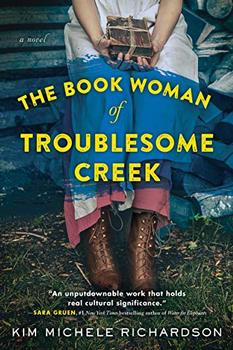Summary | Excerpt | Reading Guide | Discuss | Reviews | Beyond the Book | Readalikes | Genres & Themes | Author Bio

A Novel
by Kim Michele Richardson
I had heard the poor woman staggered into town with the pellagra rash and died in the street. Many times I'd glimpsed the rash set in from starvation. And last month a woman up in a holler lost five of her twelve children from it, and farther up in the hills, a whole family had died the month before.
"But folks tell me the books eases their burdens, it's the best thing that could happen to them," I argued.
"They can't live off the chicken scratch in them books," Pa said, flicking the wick and hushing me. "And this"—-he rapped the candle-holder with a knuckle—-"is what's best for you."
Jutted up high like that, the candle's nakedness seemed desperate, embarrassing. I caught the unsettling in Pa's gray eyes too.
* * *
It didn't matter that for a long time I'd shared Pa's fears about what might become of his only daughter, until the day I'd heard about Roosevelt creating his relief program called the New Deal to help folks around here during the Depression. We'd been depressed as long as I could remember, but now, all of the sudden, the govern-ment said we needed help and aimed to do just that. The president had added the Works Progress Administration last year to put females to work and bring literature and art into the Kaintuck man's life. For many mountainfolk, all of us around here, it was our first taste of what a library could give, a taste to be savored—-one that left behind a craving for more.
I'd seen the flyers in town asking for womenfolk to apply for the job to tote books around these hills on a mount. I snuck an application and filled it out without Pa knowing, applying to be a Pack Horse librarian a month after Mama died.
"They gave you the job?" Pa had puzzled when I got it last summer.
I didn't tell him I'd bypassed the supervisors here by picking up my application at the post office. The job application said you could turn it in to the head librarian in your town or send it to the Pack Horse li-braries' manager directly by mailing it to Frankfort. It didn't say any-thing about color, and certainly not mine. But I'd taken my chances with city folks I'd never meet instead of trusting it to the bosses here in Troublesome.
"Did no one else apply?" Pa had questioned me. "You can't work," he'd added just as quick.
"Pa, we need the money, and it's honorable work and—-"
"A workin' woman will never knot."
"Who would marry a Blue? Who would want me?"
I was positive no one would wed one of the Blue People of Kentucky. Wouldn't hitch with a quiet woman whose lips and nails were blue--jay blue, with skin the color of the bluet patches growing around our woods.
I could barely meet someone's eyes for fear my color would betray my sensibilities. A mere blush, a burst of joy or anger, or sudden star-tle, would crawl across my skin, deepening, changing my softer appear-ance to a ripened blueberry hue, sending the other person scurrying. There didn't seem to be much marriage prospect for the last female of blue mountainfolk who had befuddled the rest of the Common-wealth—-folks around the country and doctors even. A fit girl who could turn as blue as the familiar bluet damselfly skimming Kentucky creek beds, the old mountain doctor had once puzzled and then promptly nicknamed me Bluet. As soon as the word fell out of his mouth, it stuck to me.
Whenever we'd talk about it, Pa would say, "Cussy, you have a chance to marry someone that's not the same as you, someone who can get you out of here. That's why I dig coal. Why I work for scratch."
And the disgrace would linger in the dead air to gnaw at me. Folks thought our clan was inbreeds, nothing but. Weren't true. My great--grandpa, a Blue from France, settled in these hills and wedded himself a full--blooded white Kentuckian. Despite that, they'd had several blue children among their regular white--looking ones. And a few of them married strangers, but the rest had to hitch with kin because they couldn't travel far, same as other mountain clans around all these parts.
Excerpted from The Book Woman of Troublesome Creek by Cheryl Richardson. Copyright © 2019 by Cheryl Richardson. Excerpted by permission of Sourcebooks. All rights reserved. No part of this excerpt may be reproduced or reprinted without permission in writing from the publisher.




Great political questions stir the deepest nature of one-half the nation, but they pass far above and over the ...
Click Here to find out who said this, as well as discovering other famous literary quotes!
Your guide toexceptional books
BookBrowse seeks out and recommends the best in contemporary fiction and nonfiction—books that not only engage and entertain but also deepen our understanding of ourselves and the world around us.